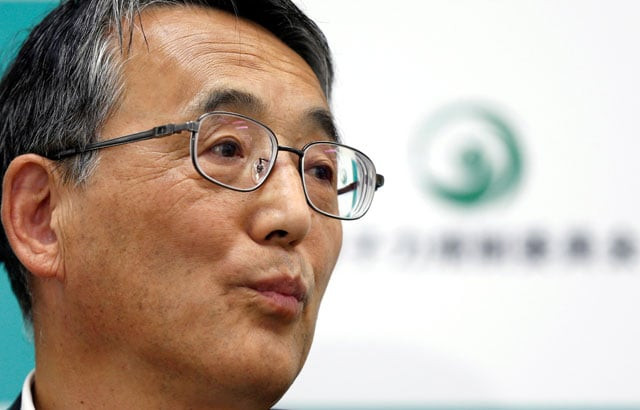As Japan re-embraces nuclear power, safety warnings persist
Japan's Nuclear Regulation Authority (NRA) approved extending the life of two reactors beyond 40 years

Japan's Nuclear Regulation Authority (NRA) Chairman Shunichi Tanaka attends a news conference in Tokyo August 21, 2013. PHOTO: REUTERS
In the first such step since the 2011 disaster, Japan's Nuclear Regulation Authority (NRA) on June 20 approved Kansai Electric Power Co's application to extend the life of two reactors beyond 40 years.
As it became clear the NRA was going to allow the extensions, a former commissioner broke a silence maintained since he left the agency in 2014 and said "a sense of crisis" over safety prompted him to go public and urge more attention to earthquake risk.
Kunihiko Shimazaki, who was a commissioner from 2012 to 2014, said a powerful quake in April that killed 69 on Kyushu island showed the risk to some of Japan's 42 operable nuclear reactors was being underestimated.
Japan nuclear dilemma to undercut power reforms
"I cannot stand by without doing anything. We may have another tragedy and, if that happens, it could not be something that was 'beyond expectations'," he said, referring to a common description of the catastrophic chain of events after the earthquake and tsunami that led to the Fukushima meltdowns.
The NRA has said it would take into account Shimazaki's position in some of its assessments. Separately when asked about the operating extensions of the reactors, a spokesperson for the regulator referred Reuters to remarks by agency chairman, Shunichi Tanaka, on the day of the extensions, when he said: "It does not guarantee absolute safety but it means the reactors have cleared the safety standards."
According to the World Nuclear Association, an industry body, early reactors were designed for a life of about 30 years, while newer plants can operate up to 60 years.
A 2012 Japanese law also limits the life of all reactors to 40 years, allowing for licence extensions only in exceptional circumstances.
Tougher regulator
The meltdowns five years ago at Tokyo Electric Power Co's Fukushima Daiichi plant after an earthquake and tsunami - the worst nuclear disaster since Chernobyl in 1986 – were blamed in an official report on lax oversight and collusion between operators and regulators.
Kyushu Electric Power is the only utility that has been cleared to restart two reactors at its Sendai plant, while other utilities have been blocked so far by legal action from nearby residents. One more reactor may restart later this month.
US, South Korea, Japan hold first anti-North Korea missile drill
After Fukushima, Japan revamped its regulator and tasked it with implementing new standards that the NRA chairman has repeatedly said are among the world's toughest.
But an International Atomic Energy Agency (IAEA) review this year made 26 suggestions and recommendations to address shortcomings - such as a lack of communication between departments and agencies, and failures on basic radiation standards - and cited only two examples of good practice.
Tokyo is revising the law to ensure there can be unscheduled inspections of nuclear sites, a standard practice in many countries, according to a NRA document, and the regulator is taking steps to improve its internal processes.
A US Nuclear Regulatory Commission official, speaking on condition of anonymity, said the Japanese regulator was still young and it would take time to build up a strong safety culture.
But opinion polls show that more than 50 percent of Japan's population remain opposed to nuclear power following Fukushima, even if using other fuels boosts electricity prices.
The NRA faces accusations that it is caving into pressure to quickly restart an industry that used to supply a third of Japan's electricity.
"The regulator is the guarantor for the population, not the manufacturers or the utilities, and it is failing," said Mycle Schneider, an independent analyst and one of the authors of an annual report on the world nuclear industry.
Chinese spy ship entered Japan waters: Tokyo
"The first level where the NRA is failing is every single day in their oversight of Fukushima," he said.
This week a power failure at the Fukushima site knocked out radiation monitoring and the freezing of a so-called ice wall to isolate the damaged reactors. Cooling and water circulation to keep the reactors in a safe state were not affected.
A NRA spokesperson said it had not issued instructions to Tokyo Electric or released a media statement because no law was broken.
The government is not pressuring the NRA to approve restarts or interfering in its operations, said Yohei Ogino, a deputy director for energy policy in the industry ministry.
But he said the government will encourage operators "to voluntarily beef up safety, as the country has lost faith in nuclear power."



















COMMENTS
Comments are moderated and generally will be posted if they are on-topic and not abusive.
For more information, please see our Comments FAQ